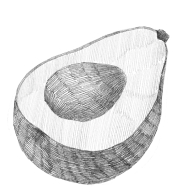Avocado

- The word “avocado” comes from the Aztec word ahuacatl, which supposedly translates to male testicles. Not for nothing were avocado fruits an Aztec symbol of love and fertility – they even grow in pairs on trees.
- At the same time, one avocado tree has both male and female flowers, and to avoid self-pollination, they grow at different times. This phenomenon is called dichogamy.
- The avocado is not a vegetable, but a fruit! The plant’s second name is Persea americana and it belongs to the genus Persea of the Laurel family. Avocado is a cousin of cinnamon and bay leaf.
- The first Europeans to eat avocados were Spanish conquistadors in the 16th century. They survived in Mexico thanks to this fruit. As a result of the Spanish conquest, avocados spread to South and Central America.
- The name “avocado” was coined by an Irishman, Sir Hans Sloan: this is what he called the tree in a 1696 catalog of Jamaican plants. He also called the tree “alligator pear” because of the pear shape and rough texture of the peel.
- There are over 500 varieties of avocados grown around the world.
- The oldest avocado trees grow in Mexico – they are 400 years old.
- The leaves of the avocado tree are used to make medicinal tea.
- If you want to speed up the ripening process of avocados, just put them in a kraft paper bag for 2-4 days. And if you put a banana in the bag, the avocado will ripen even faster!
- Avocados are made up of 73% water, 15% fat, 8.5% carbohydrates (mostly fiber), and 2% protein.
- Contains the highest amount of fiber of any fruit: 150 grams of avocado provides 40% of the daily requirement for dietary fiber. It also contains vitamins B6, C, K, E, potassium, magnesium and folic acid.
- Avocados have twice as much potassium as bananas: one avocado contains 975 mg of potassium, while a banana contains 487 mg.
- Avocado seed and peel contain persin, a fungicidal toxin that is deadly to animals, especially cows and horses, because they can swallow the whole seed.
- Eating avocados daily can improve LDL cholesterol (bad cholesterol) levels in people who are overweight.